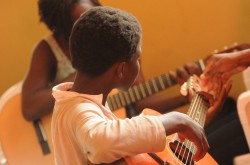Does Music Help You Learn a Language?
Remember those excruciating clarinet lessons your parents made you take in fourth grade? Well despite how much you may have hated them back then, they may help you with your language studies today. Liisa Henriksson-Macaulay, author of The Music Miracle: The Scientific Secret to Unlocking Your Child’s Full Potential, claims that learning music at a young age is instrumental (PUN!) toward learning languages later in life. According to Henriksson-Maculay, it is “the only proven method to boost the intellectual, linguistic, and emotional capacity of a child”.
Academic Studies
And she’s not the only one who’s saying this either. Studies in numerous academic journals have been published in recent months claiming the same. According to an article published in The NeuroScientist, making music can help promote ‘brain plasticity’ throughout the span of your life! Brain plasticity refers to the neural pathways in your brain. In other words, music helps you learn stuff way faster and more easily because it makes your brain more organized. Why? Because “playing a musical instrument is an intense, multisensory, and motor experience”. Indeed, learning music requires the use of a lot of the same properties of the brain as does a language. For example, learning to read the notes on a page as you play them requires a similar series of neurological connections to reading a book out loud.
Another article published in Science Magazine found that there is “predictive validity of such data in relation to new learning in speech and music domains”. As you can see, there’s some pretty substantial evidence just reaching the surface now that says those clarinet lessons are going to pay off one day.
Some Important Details
You may ask yourself, ‘So if I just take some guitar lessons now then my Russian classes will be a piece of cake, right?’ No, not exactly. Apparently, you only have until around the age of seven to learn music. This is an essential point in the brain’s development, where about 95% of its growth takes place. But for those who stuck it out in band practice, you may have a larger vocabulary and a better understanding of grammar as a result. Music lessons apparently help with fluency in your native tongue and your aptitude for foreign languages.
So What Now?
Well, let’s see. First off all, if you’ve got kids, buy them a guitar or a piano, quick! Maybe not a drum set. I had one and my neighbors hated me for it. Also, if you remember taking some lessons yourself as a kid, maybe you’re better than you think at learning a language! Use your predisposition to your advantage! And if you didn’t play an instrument, there’s still hope for you! Millions of people are learning languages all over the world. There’s only one way to find out. Take one of our free language exams. Any questions you can contact us here.


